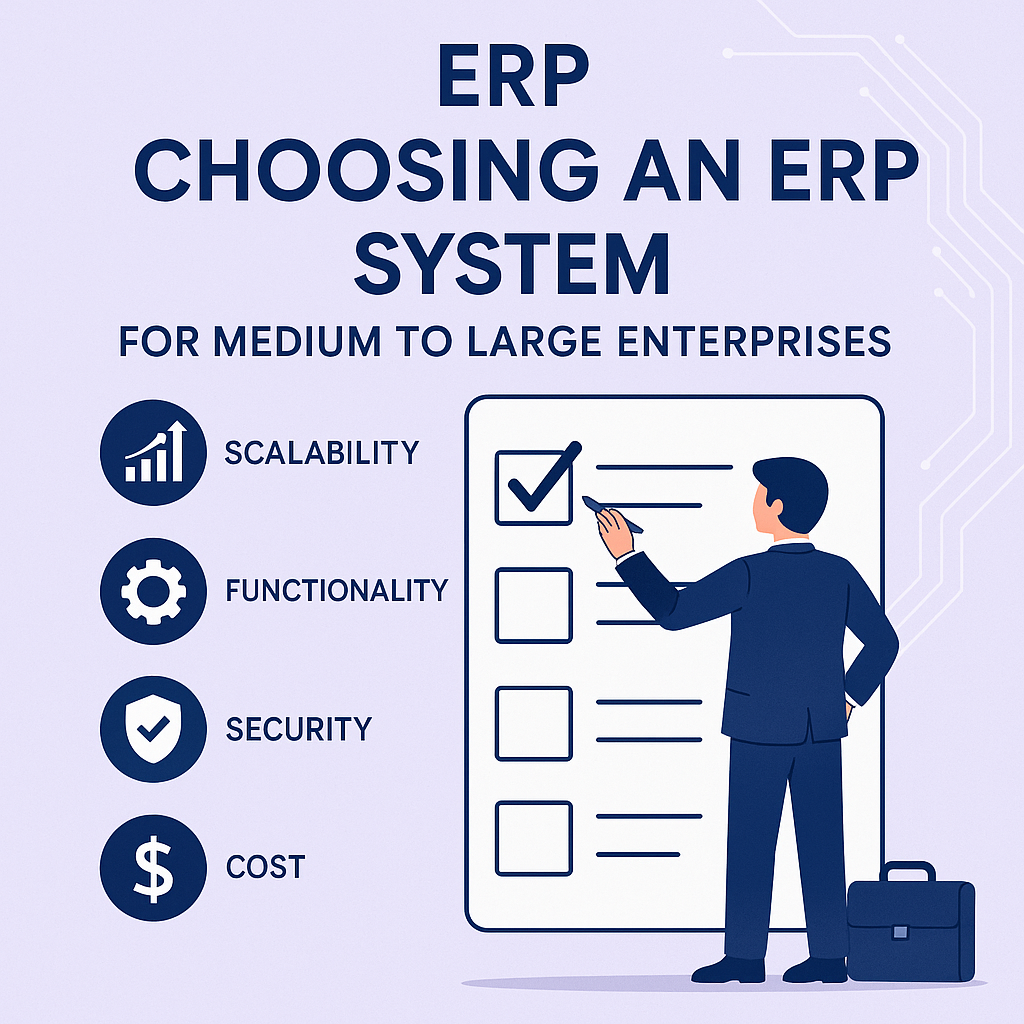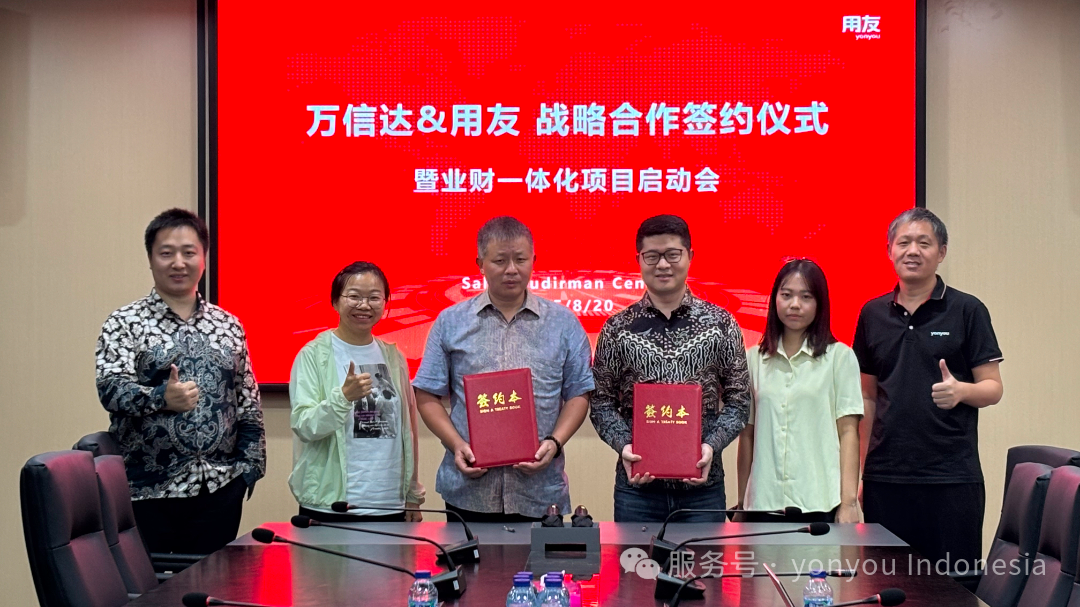In today’s dynamic business landscape, Indonesian medium to large enterprises, particularly within the bustling manufacturing and finance sectors, face increasing pressure to optimize operations, enhance efficiency, and drive sustainable growth. Enterprise Resource Planning (ERP) systems are no longer a luxury but a strategic imperative for achieving these goals.
However, selecting the right ERP solution amidst a myriad of options can be a daunting task. This comprehensive guide will walk you through the essential considerations and key factors to ensure your ERP investment delivers maximum ROI for your Indonesian enterprise.
Why ERP is Crucial for Indonesian Medium to Large Enterprises
Before diving into the selection process, it’s vital to understand the tangible benefits an effective ERP system brings:
- Streamlined Operations: Unify disparate departmental processes, from finance and procurement to manufacturing and supply chain, eliminating data silos and manual redundancies.
- Enhanced Data Visibility & Insights: Gain real-time, accurate insights into your entire business operations, enabling data-driven decision-making.
- Improved Efficiency & Productivity: Automate routine tasks, reduce human error, and optimize workflows, freeing up your team to focus on strategic initiatives.
- Better Financial Control & Compliance: Strengthen financial management, improve budgeting, forecasting, and ensure adherence to Indonesian regulatory requirements.
- Scalability for Growth: A robust ERP system like Yonyou’s YonBIP (Business Innovation Platform) is designed to scale with your business, supporting future expansion and evolving needs.
- Competitive Advantage: Respond faster to market changes, improve customer satisfaction, and gain an edge over competitors through optimized processes and informed strategies.
Key Considerations When Selecting an ERP in Indonesia
When evaluating ERP solutions for your Indonesian enterprise, keep the following critical factors in mind:
1. Industry-Specific Functionality
Your industry has unique requirements. For manufacturing, look for modules that cover:
- Production Planning & Scheduling: Optimize production lines, manage resources efficiently, and meet delivery deadlines.
- Inventory Management: Real-time tracking of raw materials, work-in-progress, and finished goods to minimize waste and stockouts.
- Quality Control: Integrate quality checks throughout the production process to ensure product excellence.
- Supply Chain Management: End-to-end visibility and control over your supply chain, from sourcing to distribution.
For finance, prioritize features such as:
- General Ledger & Financial Reporting: Comprehensive financial accounting, accurate ledger management, and customizable reporting capabilities.
- Accounts Payable & Receivable: Efficient management of invoices, payments, and collections.
- Budgeting & Forecasting: Tools for robust financial planning and predictive analytics.
- Multi-currency & Multi-entity Support: Essential for businesses with international operations or multiple subsidiaries, as seen in the success of companies like Mixue Ice Cream & Tea using YonBIP for unified financial management across Southeast Asia.
- Tax Compliance: Ensure the ERP system can handle Indonesian tax regulations and reporting requirements.
2. Cloud-Native vs. On-Premise
The shift to cloud computing is accelerating. Consider the benefits of a cloud-native ERP solution:
- Reduced IT Overhead: No need for significant hardware investments or in-house IT maintenance.
- Accessibility: Access your ERP system anytime, anywhere, fostering remote work capabilities and business continuity.
- Scalability & Flexibility: Easily scale resources up or down based on your business needs.
- Automatic Updates: Benefit from continuous feature enhancements and security patches without manual intervention.
Yonyou’s YonBIP, for example, is built on a cloud-native architecture, offering comprehensive cloud services designed for growing enterprises.
3. Integration Capabilities
Your ERP system shouldn’t operate in a vacuum. It must seamlessly integrate with your existing business applications, such as CRM, HR, and e-commerce platforms. A robust integration platform, like Yonyou’s YonLinker, ensures data flows smoothly across your entire digital ecosystem, providing a unified view of your business.
4. Data Intelligence and Analytics
In the age of big data, an ERP system that can not only collect but also analyze your operational data is invaluable. Look for:
- Real-time Dashboards: Customizable dashboards that provide a quick overview of key performance indicators (KPIs).
- Business Intelligence (BI) Tools: Advanced analytics capabilities to uncover trends, identify opportunities, and mitigate risks.
- AI and Machine Learning Integration: Solutions that leverage AI for predictive analytics, intelligent automation, and enhanced decision support (e.g., Yonyou’s YonAI).
5. Scalability and Future-Proofing
Choose an ERP system that can grow with your company. Consider whether the vendor offers:
- Modular Architecture: Allowing you to implement specific modules as needed and expand functionality over time.
- Customization Options: The ability to tailor the system to your unique business processes without extensive coding.
- Commitment to R&D: A vendor that continuously invests in research and development ensures their software remains cutting-edge.
6. Vendor Reputation and Local Support
Partnering with a reputable ERP vendor is paramount. In Indonesia, look for:
- Proven Track Record: Experience in implementing ERP solutions for similar-sized businesses in your industry.
- Local Presence and Support: Access to local consultants, training, and technical support to address issues promptly and effectively. Yonyou has a strong presence in Southeast Asia, including PT Yonyou Network Indonesia, offering local expertise and support.
- Customer Success Stories: Review case studies and testimonials from other Indonesian companies that have successfully implemented their ERP solution.
7. Total Cost of Ownership (TCO)
Beyond the initial licensing or subscription fees, consider the total cost of ownership, including:
- Implementation Costs: Consulting, configuration, and data migration.
- Training Costs: For your employees to effectively use the new system.
- Maintenance and Support Fees: Ongoing costs for updates, bug fixes, and technical assistance.
- Customization Costs: If significant modifications are required.
Yonyou: Empowering Indonesian Enterprises with Digital Transformation
Yonyou, a global leading provider of digital and intelligent software and services, has been empowering enterprises worldwide since 1988. With a significant presence in Southeast Asia for over 15 years, Yonyou understands the unique challenges and opportunities within the Indonesian market.
Yonyou’s flagship offering, YonBIP (Business Innovation Platform), is a new-generation digital and intelligent business innovation platform designed to meet the evolving needs of large and medium-sized enterprises. YonBIP integrates:
- YonApplication: A comprehensive suite of business applications covering finance, supply chain, manufacturing, HR, and more.
- YonBuilder: A development platform for customization and extension.
- YonData: A robust data platform for intelligent analysis and reporting.
- YonAI: Leveraging enterprise AI large models for intelligent interaction and data-driven insights.
Notable Success Story in Indonesia:
Mixue Ice Cream & Tea, a globally recognized brand with operations across Southeast Asia, successfully leveraged YonBIP to achieve unified financial management across four countries, including Indonesia. This implementation enabled:
- Standardized master data management for materials, suppliers, and customers.
- Unified accounting subjects and group report formats.
- Real-time insights into the operational status of each country, despite local tax system differences.
- Enhanced centralized financial control while granting operational autonomy to local branches.
This success highlights YonBIP’s capability to empower multinational companies with centralized control and local adaptability, a critical factor for many growing Indonesian enterprises.
Conclusion
Choosing the right ERP system is a significant strategic decision that can profoundly impact your Indonesian enterprise’s future. By carefully considering industry-specific needs, technological architecture, integration capabilities, data intelligence, scalability, and vendor support, you can make an informed choice.
Yonyou, with its deep industry expertise, advanced cloud-native solutions like YonBIP, and a proven track record in supporting global enterprises, stands as a strong partner for Indonesian businesses seeking to embark on their digital transformation journey.
Ready to explore how Yonyou can empower your Indonesian enterprise? Contact us today for a consultation.




